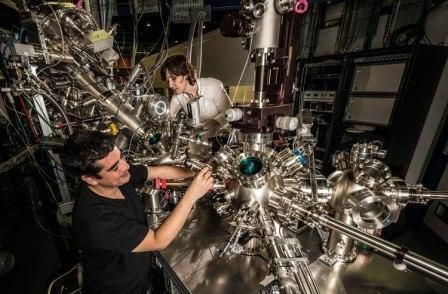
05/11/2014
New catalysts investigated with the ALBA Synchrotron
New catalysts investigated with the ALBA Synchrotron
A group of researchers, led by UPC university in Barcelona, which works on catalysts, has discovered that atoms react differently depending on the characteristics of the support that is used. Part of this study, which has been published on October 31 in the famous Science Magazine, was performed at the CIRCE beamline of ALBA Synchrotron.
The study is an important step forward in the design of new catalysts with applications in the field of energy: the catalyst investigated by the researchers contains metal (rhodium and palladium) nanoparticles and is very effective at producing hydrogen, a product that could replace fossil fuels and contribute to the energy transition.
News based on the press release issued by ALBA Synchrotron.
Image: ALBA Synchroton - Researchers Virginia Pérez-Dieste and Carlos Escudero at NAPP endstation of CIRCE beamline of ALBA Synchrotron
The study is an important step forward in the design of new catalysts with applications in the field of energy: the catalyst investigated by the researchers contains metal (rhodium and palladium) nanoparticles and is very effective at producing hydrogen, a product that could replace fossil fuels and contribute to the energy transition.
News based on the press release issued by ALBA Synchrotron.
Image: ALBA Synchroton - Researchers Virginia Pérez-Dieste and Carlos Escudero at NAPP endstation of CIRCE beamline of ALBA Synchrotron
More news
13/12/2017
ALBA Synchrotron Works for People’s Health
01/12/2017
NanoPlastics Awarded As Best Business Idea Of The UAB University Research Park
23/11/2017
The Excellence of Natura Bissé Awarded by Forbes Travel Guide
08/11/2017
SENER, 50 Years in Space and Ambitious Projects Such As the E-ELT Telescope
02/11/2017
The Barcelona Synchrotron Park in the SmartReFlex European project
26/10/2017
New Findings on Malaria Thanks to ALBA Synchrotron









